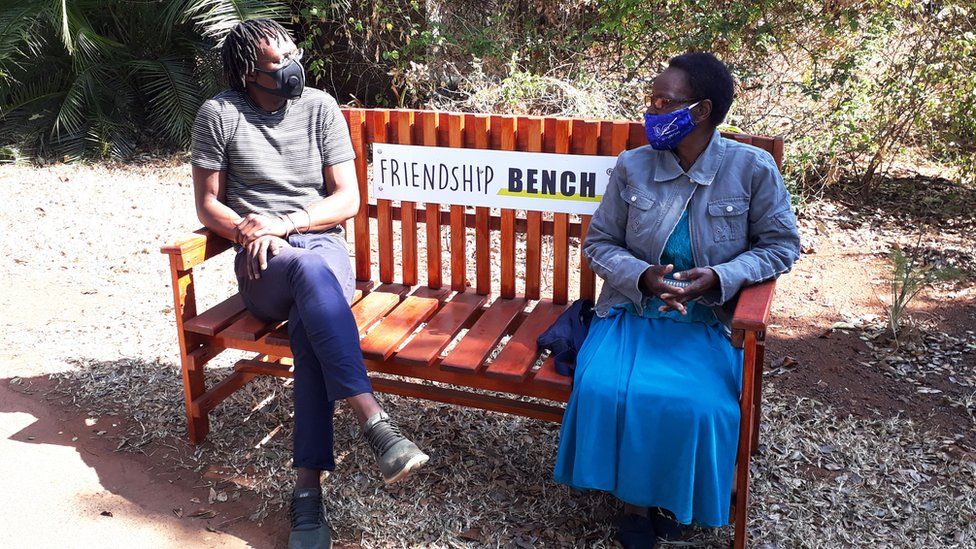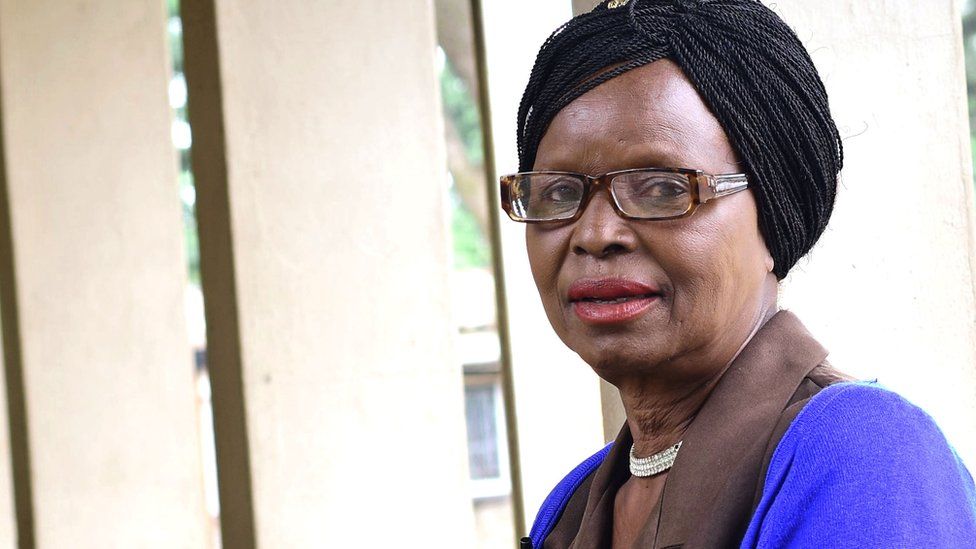As warnings of a "moral catastrophe" over the availability of coronavirus vaccines in poorer countries grow, Zimbabwean psychiatrist Dr Dixon Chibanda describes how it would help him and the special team of grandmothers he works with.
It has been five weeks since I contracted Covid-19, even though I was doing everything not to get it: masking, sanitising and distancing.
The sense of helplessness associated with not being able to breathe as I watched my oxygen saturation fluctuating was profound, even for a medical doctor like myself.
I also had the added knowledge that the likelihood of getting oxygen if or when I needed it was next to zero in our resource-strapped country.
Struggling with extreme fatigue and intermittent shortness of breath, I realised on day three that I could die.
While anybody can die from Covid-19, the risk is higher in a place like Zimbabwe where the health system is extremely compromised.

Indeed, during the same period that I was sick, five doctors I have worked closely with over the years died from it. They had access to medical care and they still died.
These individual deaths are devastating. But also, the impact of losing five experienced doctors within four weeks for a country like Zimbabwe represents a significant communal loss.
Fortunately for me, on day five of my illness, my oxygen saturation started to pick up.
It is not clear why I recovered while some colleagues with similar backgrounds to mine died.
There is much to learn about this virus.

As I gradually began to improve, my concern shifted to the organisation I have been running for over 10 years, the Friendship Bench.
This is a community-based psychological treatment programme delivered by over 700 trained community grandmothers in over 100 communities in Zimbabwe.
In a country with just 13 psychiatrists for a population of 16 million, this model has helped expand mental health outreach.
It has taken years to build the Friendship Bench model and show that through talk therapy, trained grandmothers can treat depression, anxiety and alleviate suicidal thoughts across communities in Zimbabwe and beyond.
'Grandmothers are vulnerable'
This past year, these grandmothers have become key frontline workers addressing the high rates of mental illness linked to the Covid-19 crisis.
But as the virus spreads faster and as the number of deaths exponentially rise in Zimbabwe, these grandmothers, just like the frontline medical doctors, have become vulnerable.
One day I called grandmother Kusi Kwenyu, who has been with Friendship Bench for over 10 years, to find out how the grandmothers are doing in Mbare, the place where Friendship Bench first started.
I had not been in touch with any of the grandmothers since I fell ill.

As the phone rang, I found myself anxious with a negative premonition. Finally, she picked up the phone.
"I'm so happy to hear your voice," I remarked with relief.
"I'm happy to know you are recovering. We have been praying for you," grandmother Kusi replied, sounding equally relieved.
"How are you and all the other grandmothers, is everyone OK? Are you all at home, self-isolating?"
There was a long pause before she responded.
"We have lost one grandmother."
'We can't self-isolate'
Another pause followed, and she cleared her throat before responding to my second question about precautions she was taking.
"Self-isolate in Mbare? That is not possible. Besides, the community now needs us more than ever."
"But you could provide services through your mobile phone from home as was previously recommended," I said.
She interjected before I could carry on.
"The other day a young man whose father died from Covid got in touch to talk. He was extremely distraught and needed to see me in person.
"I couldn't tell him to go home and talk to me over the phone - he has no phone. I talked to him because he is a high-risk client. I tried as best I could to distance while we spoke."
She added: "We have a crisis."https://emp.bbc.com/emp/SMPj/2.39.11/iframe.htmlmedia captionDr John Nkengasong: I am worried
She was right - more people than ever needed the services of the Friendship Bench, and those services could best reach people through in-person conversations.
"Is there anything you think can be done to protect you and the 700 grandmothers doing the Friendship Bench?" I asked glumly.
In her usual thoughtful pause, she cleared her throat and said: "We need a vaccine. A vaccine for every grandmother."
Later that day, I read in the news that close to 40 million doses of vaccines have been distributed globally, but very few have been distributed to Africa.
And over 7.25 billion doses of vaccines have been pre-purchased by Western countries.
The next day, I was following a virtual memorial via Zoom for a medical colleague who succumbed to Covid-19.
As the service ended, I wondered how many health professionals and grandmothers will have to die before a vaccine is available here.
How many frontline workers like them will suffer as they try to ease the suffering of others?
Later, I received a WhatsApp message from a colleague: Another doctor had died from Covid-19.
We need the vaccine to come to Africa.
Latest Stories
-
The Legon VC… and childhood memories
2 minutes -
The absurd inequality of climate work: Overcoming dilemmas in the green transition
25 minutes -
ORAL team receives first dossier of ¢500m National Service ghost names scandal
36 minutes -
AfroFuture’s Culture Beach Jam comes off Dec. 28 & 29
40 minutes -
NDC gov’t to address first quarter expenditure after January 7 – Ato Forson to Ghanaians
52 minutes -
Man sentenced to 5 years for vandalism at Parliament
1 hour -
Art for development: Isaac Koney tells his story
2 hours -
“I prayed for it” – Lady appreciates Joy Prime, Peace Bridals for free wedding gown
2 hours -
CEO Network Ghana pay courtesy call on Mahama
2 hours -
Lady Rhoda features Minister Igwe on new single ‘Thank You’
2 hours -
Labadi Beach Hotel secures court injunction against Polo Beach Club
2 hours -
Vezsel Music releases debut single ‘Asa Papa’ off upcoming ‘Joy In The Morning’ EP
2 hours -
National Security Task Force assures EC of security to continue re-collation
3 hours -
We are ready for “24 Hour Economy” policy provided there is the needed incentives – business associations
3 hours -
K-pop continues to rise on Nigerian music charts
3 hours

